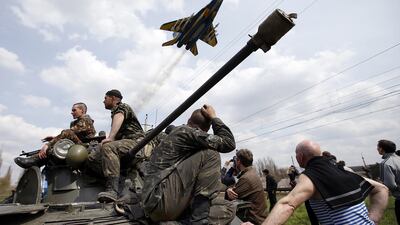All is not quiet on the eastern front.
Top US and Nato officials have in recent days issued grave warnings of a potentially large Russian incursion in Ukraine’s south-eastern Donbas region, part of which has been occupied by pro-Russian forces since Moscow's 2014 annexation of Crimea.
This is far from the region's only threat of instability. Across the Caucasus Mountains, Armenia and Azerbaijan are tussling again, a year after the latter captured most of the disputed region of Nagorno-Karabakh in a six-week conflict. In Turkey, the government and its citizens are struggling with a fast-plunging lira, rising inflation and deepening economic mismanagement. And would-be migrants are dying of hunger and cold as security forces clash on the border between Belarus and EU member state Poland.
But Russia's military build-up along the border, along with President Vladimir Putin's July assertion that Ukraine is an integral part of his country, has put Ukraine and regional allies on high alert. Not coincidentally, all this comes just as Ankara and Kiev embrace deeper ties. In a phone call last week, presidents Volodymyr Zelensky and Recep Tayyip Erdogan discussed the Russian threat, a looming free trade deal and further arms co-operation.
The Black Sea neighbours have already begun to integrate drone production and Ukraine is expected to buy its second batch of Turkish-made Bayraktar drones next year, following an initial 2018 purchase that finally made an impact in the country's east last month.
On October 26, the Ukrainian military sent the Bayraktar TB2 into action for the first time in response to a sustained howitzer assault from the so-called Donetsk People's Republic troops that killed one Ukrainian soldier and injured two more. Without even crossing into disputed airspace, the TB2 took out one of the howitzers and halted the DPR's shelling, marking yet another international success for Turkey's advanced drones following campaigns in Syria, Libya and Nagorno-Karabakh.
Former Ukrainian military officer Taras Chmut, head of the Return Alive Foundation, argued that Kiev had sent Moscow a message by showcasing its ability to hit Russia without even needing to cross the contact line.
Russian bloggers initially argued that video footage of the strike had come from Nagorno-Karabakh and that the TB2 had, in fact, missed its target. Once that failed, Russian outlets asserted that the use of the drone had violated the Minsk agreements. But that holds little water as the same could be said of the DPR's use of a howitzer on the frontlines.
In the end, Russian Foreign Minister Sergei Lavrov argued that with its drone strike, Ukraine sought to further destabilise the situation by provoking Moscow into a military response. Moscow seemed to walk right into Kiev's supposed trap with its significant build-up of forces along the border.
But rather than readying for a new incursion, what seems more likely is that Russia is merely showing its might.

Back in April, Ukrainian officials warned of Russia beefing up its Donbas presence with 100,000 additional troops, along with military vehicles and heavy artillery. Top western officials, including US President Joe Biden, warned of a looming Russian invasion, but it never materialised and Moscow soon pulled back. Two years prior, in April 2019, a series of major Russian military exercises along the border and in the Sea of Azov evoked similar concerns, but nothing came of that either.
This time, too, Russia may be merely flexing in response to a foe that has reasserted its military capabilities thanks to deeper defence ties with a Nato member state.
International observers often criticise Ankara for its tilt toward Moscow in recent years, most notably its 2019 purchase of Russian-made S-400 missile defences. That decision led to US sanctions and to Turkey being forced out of the US's F-35 production process, as well as calls for Turkey's eviction from Nato. But what have Nato and the West done to help Ukraine beat back the Russian threat? Mr Zelensky has repeatedly pressed Nato for a timeline on Ukrainian accession, with little result.
Though responding to Russian aggression is a founding principle of the alliance, the position of the US and other key Nato states is that the bloc is unwilling to add a new member that's already at war with Russia. To his credit, Mr Biden has restarted the military and financial backing of Kiev paused by the previous administration due to political machinations.
But he also waived sanctions on the Russian company building the Nord Stream 2 pipeline that will carry Russian natural gas to Germany via the Baltic Sea, cutting Ukraine out of billions in energy revenues. "Your decision on Nord Stream 2," Ukrainian parliamentarians wrote to Mr Biden in August, "rewards Russian President Vladimir Putin with tens of billions of dollars … [and] enhances Russia's ability to blackmail Ukraine and Europe."
To sum up, the West has doubly rewarded Moscow when it comes to Ukraine, while Ankara has boosted Kiev's military might.
It's easy to criticise Ankara's regional balancing act: standing against the Syrian regime while attacking US-allied Syrian Kurdish forces; overseeing Nato's second-largest army while maintaining semi-friendly ties with strange bedfellows such as Russia, Iran and Israel. And its drone sales to Ukraine may well be driven by self-interest rather than a desire to counter Russian encroachment.
But what matters is the result, and Lavrov's call to his Turkish counterpart on Friday, warning of close defense ties with Kiev, suggests it may already be significant. If Turkey's deepening alliance with Ukraine ends up playing a key role in narrowing Russian ambitions – still a big if – then Ankara will be deserving of western praise, and thanks.


